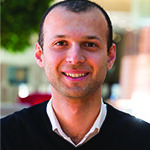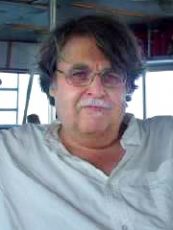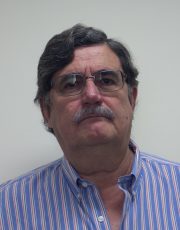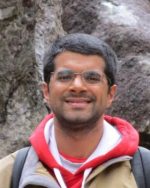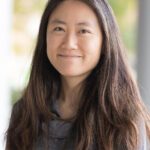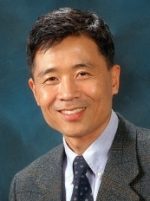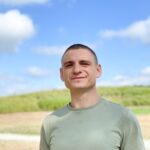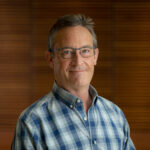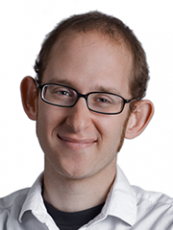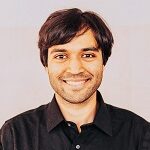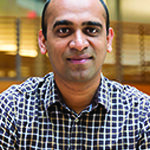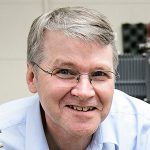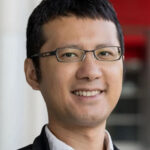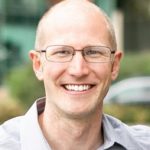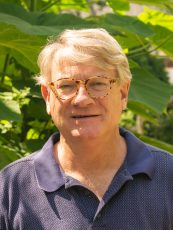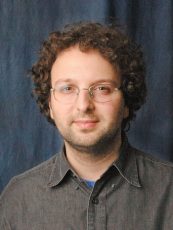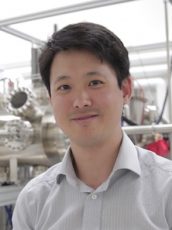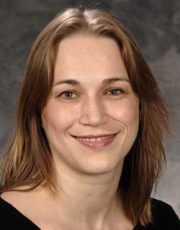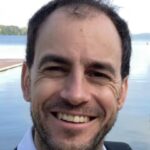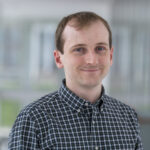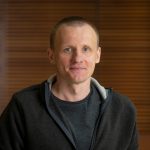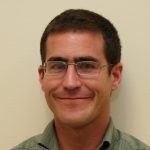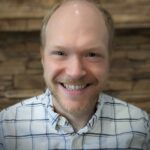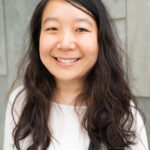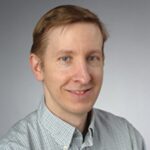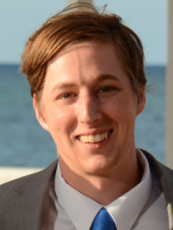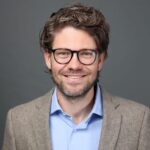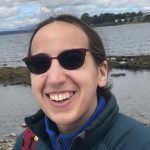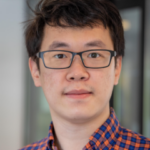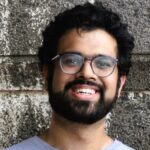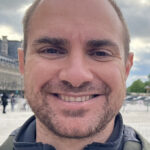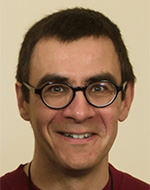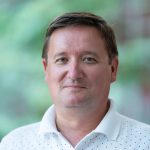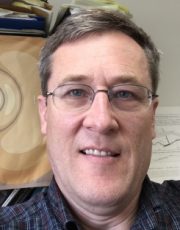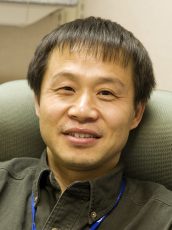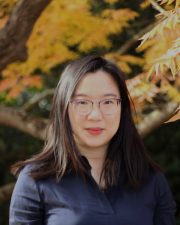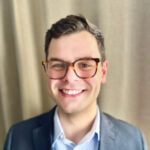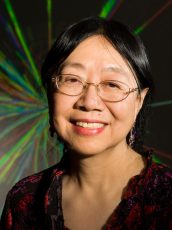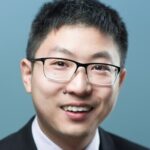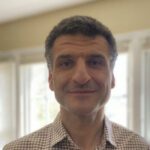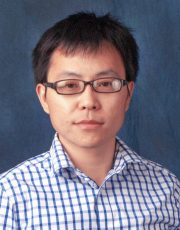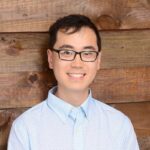Aws Albarghouthi
Associate Professor of Computer Sciences
Research Website: Albarghouthi Group
I study the art and science of program synthesis and verification. My group is currently focused on two problems: a) automatically synthesizing compilers for quantum computers and b) certifying robustness and fairness of machine learning.
A. Baha Balantekin
Eugene P. Wigner Professor of Physics
Research Website: Balantekin Group
I am a theoretical physicist working at the interface of nuclear physics, particle physics, and astrophysics using tools from quantum information science.
Victor Brar
Associate Professor of Physics
Research Website: Victor Brar Lab
The Brar group probes the electronic, magnetic, and optical behavior of materials at the atomic-scale in search of new phenomena that have both fundamental and technological importance.
Jennifer Choy
Assistant Professor of Electrical and Computer Engineering
Research Website: Lab of Quantum and Photonic Engineering
The Choy group is interested in the development of quantum sensors (based on neutral atoms and atom-like systems in solids) for sensitive measurements of physical quantities such as inertial forces, magnetic fields, and time, as well as the application of nanoscale optics and photonics to improve the utility and performance of quantum instruments.
Chang-Beom Eom
Raymond R. Holton Chair Professor in Engineering and Theodore H. Geballe Professor
Research Website: Oxide Lab
The research of our group spans many areas of heteroepitaxy of complex oxides and nanostructure fabrication, from thin film synthesis to characterization and device application of various novel materials. Our interest includes the synthesis and characterization of epitaxial oxide heterostructures and heterointerfaces uniquely suited for oxide nanoelectronics piezoelectric heterostructures for hyper-active MEMS/NEMS, ferroelectric and multiferroics for magnetoelectric and photovoltaic devices. Our interest also includes the epitaxial growth of ferronictide superconducting thin films and 2-dimensional electron gas at oxide hetero-interfaces.
Mark Eriksson
John Bardeen Professor and Steenbock Professor of Physics
Research Website: Eriksson Group
The Eriksson Group studies quantum computing and information, with a special emphasis on semiconductor qubits in silicon and silicon-germanium, both on their own and coupled to superconducting waveguides and circuits. We use state-of-the-art clean-room processing techniques to nanofabricate these qubits, and we measure, characterize, and program the qubits using microwave electronics techniques at dilution refrigerator temperatures, which are as low as 10 mK. In addition to quantum computing, we study thermal transport in nanostructures and NV-centers for chemical sensing.
Mark Friesen
Distinguished Scientist
Research Website: Friesen Group
My research interests include the theory of solid state qubits, the optimization of qubit performance, and simulations of qubit devices and their evolution.
Randall Goldsmith
Associate Professor of Chemistry
Research Website: Goldsmith Group
Our group believes that studying chemical and biophysical systems via single-molecule techniques is a profound and absolutely delightful way of doing science. We use single-molecule methods to study chemical reactions such as homogeneous catalysis, biophysical processes such as protein folding, and materials properties such as energetic disorder in photovoltaics. We build instruments, synthesize molecules, fabricate nanophotonic devices, and are trying to make some really exciting new measurements.
Rishab Goyal
Assistant Professor of Computer Sciences
Research Website: Goyal Group
I am interested in Cryptography, Computer Security, and Theoretical CS. A special theme in my research is to design advanced cryptosystems with post-quantum security as well as study applications of quantum computing in cryptography.
Mohit Gupta
Associate Professor of Computer Sciences
Research Website: Gupta Group
I am an associate professor of Computer Sciences at the University of Wisconsin-Madison. Before coming to Madison, I was a research scientist in Columbia University. I received my PhD from the Robotics Institute, Carnegie Mellon University.
I direct the WISIONLab with research interests broadly in computer vision and computational imaging.
Shamgar Gurevitch
Professor of Mathematics
Research Website: Gurevitch Group
The mathematics of the Clifford-Pauli gates.
Robert Hamers
Professor of Chemistry
Research Website: Hamers Group
Our research is centered in the unique chemical and physical phenomena that occur at surfaces and interfaces of solid materials.
Tsung-Wei Huang
Assistant Professor of Electrical and Computer Engineering
Research Website: Huang Group
Our group creates novel software systems to simplify the building of performance-critical applications, such as electronic design automation (EDA), machine learning (ML), and quantum computing. Our software has been used by thousands of people in industry and academia.
Robert Jacobberger
Assistant Professor of Electrical and Computer Engineering
Research Website: Jacobberger Group
The Jacobberger group develops scalable approaches to engineer low-dimensional (2D, 1D, and 0D) materials, heterostructures, assemblies, and devices with atomic-scale precision. We are particularly interested in single-photon emitters and spin defects in semiconductors, novel quantum phenomena in heterostructures, and molecular-based qubit systems.
Robert Joynt
MS-Physics-Quantum Computing Program Director; Professor of Physics
Research Website: Joynt
My research is in Quantum Computing and Condensed Matter Theory. Presently, I am working on new forms of error correction involving 2-designs. I have a longstanding project on electromagnetic noise in quantum computers, particularly on the spatial correlations present in such noise. I am working improvements for the quantum adiabatic algorithm that involve the idea of catalysis. We have recently developed a theory of discrete scale invariance in Weyl semimetals and an explanation of the Kerr effect in unconventional superconductors.
Mikhail A. Kats
Associate Professor of Electrical and Computer Engineering, Dugald C. Jackson Faculty Scholar
Research Website: Kats Group
The group of Prof. Mikhail Kats carries out experimental and theoretical research across the fields of optics and photonics, device physics, and nanoscale science. The primary goals of the group are to investigate fundamental problems in optics and photonics and to create next-generation optical components to emit, modulate, and detect light across the visible and infrared spectral ranges.
Jason K Kawasaki
Associate Professor of Materials Science and Engineering
Research Website: Kawasaki Group
We use molecular beam epitaxy (MBE) to synthesize thin films and superlattices of Heusler compounds and engineer their electronic, magnetic, thermoelectric, topological, and mechanical properties.
Irena Knezevic
Patricia and Michael Splinter Professor in Electrical and Computer Engineering
Research Website: Knezevic Research Group
Our group explores the interaction of charge carriers, lattice vibrations, and electromagnetic waves in nanoscale systems. Our research is theoretical in nature: we develop novel mathematical and computational techniques in order to simulate the exciting world at the nanoscale. We also collaborate with several excellent experimental groups.
Elio König
Assistant Professor of Physics
Research Website: König Group
My research is stimulated by the fascination for the collective many-body behavior of quantum particles and aims to uncover both fundamental physical phenomena and potential practical applications.
Roman Kuzmin
Assistant Professor of Physics
Research Website: Kuzmin Group
Our focus is on the applications of high-impedance superconducting circuits to quantum simulations, quantum computing, and metrology. Specifically, we utilize qubits and long arrays of Josephson junctions to implement strongly correlated models of condensed matter physics. Our current work centers on understanding quantum phase transitions in quantum impurity models and the dynamics of many-body interacting systems. We are also working on creating better qubits for quantum computing and simulations.
Alex Levchenko
Associate Professor of Physics
Research Website: Levchenko
I am a condensed matter theorist with research interests in quantum kinetics, mesoscopic effects, nonequilibrium systems, superconductivity, and topological systems.
Robert McDermott
Professor of Physics
Research Website: McDermott Lab
Superconducting integrated circuits are a leading candidate for the realization of quantum bits (“qubits”). We are focused on the development of technologies to enable scaling to quantum arrays comprising thousands or millions of qubits, as needed for robust quantum error correction. We have separate research efforts in the areas of quantum coherence, quantum measurement, and high-fidelity coherent control. In addition, we are working with collaborators to develop hybrid quantum systems that capitalize on the distinct strengths of disparate quantum technologies.
Matthew Otten
Assistant Professor of Physics
Research Website: Otten Group
The Otten Lab’s goal is to accelerate the realization of useful, utility-scale quantum computers, networks, and sensors. We develop, analyze, and test quantum algorithms for applications in quantum chemistry, quantum dynamics, and quantum machine learning. Our team also focuses on creating and implementing quantum characterization, verification, and validation (QCVV) methods to understand and mitigate inevitable errors.
Yuan Ping
Associate professor in MSE
Research Website: Ping Group
Dr. Ping is as associate professor in MSE and affiliated professor with Chemistry and Physics. Her research group focuses on developing and employing first-principles many-body theory and quantum dynamics for materials applications.
Daniel Rhodes
Assistant Professor of Materials Science Engineering
Research Website: Rhodes Group
Our research group focuses on cradle-to-grave processing of 2d layered materials, both in bulk and in 2D – controlling the growth, heterostructure stacking, and fabrication processes with the primary goal to reveal and study sensitive quantum phenomena which are typically destroyed by disorder.
Mark Saffman
WQI Director; Johannes Rydberg Professor of Physics
Research Website: Saffman Lab
We are exploring the use of neutral atoms for quantum information processing using several related but complementary approaches. Experiments are underway with three different atomic species: Rb, Cs, and Ho.
Josiah Sinclair
Assistant Professor of Physics
Research Website: Sinclair Group
I am an experimental physicist researching atomic physics platforms for quantum computing. My research focuses on harnessing the power of nonlocal entanglement to build scalable modular fault-tolerant quantum computers and distributed quantum sensors with atom arrays and optical cavities. I am also interested in quantum error correction in distributed architectures, quantum foundations, and teaching quantum mechanics.
Micheline Soley
Assistant Professor of Chemistry
Research Website: Soley Group
The Soley Group pursues research at the intersection between chemistry, physics, applied mathematics, and computer science with a particular interest in ultracold chemistry and collisions, quantum computing algorithms, quantum reflection, and PT symmetry.
Tiancheng Song
Assistant Professor in Physics
Research Website: Song Group
The Song group focuses on exploring novel 2D quantum materials and their van der Waals heterostructures. The group is particularly interested in studying exotic 2D magnetism, 2D superconductivity, and topology by using various techniques, such as nanodevice fabrication, magneto-optics, quantum transport, thermoelectrics, optoelectronics, optical spectroscopy and microscopy.
Swamit Tannu
Assistant Professor of Computer Sciences
Research Website: Tannu Group
I study programming models and architectures for Quantum Computers. My research focuses on developing control architecture and software (programming models, interfaces, compilers) for quantum computing platforms. I am broadly interested in Computer Architecture, Quantum Computing, and Cryogenic Electronics.
George Tzimpragos
Assistant Professor of Electrical and Computer Engineering
Research Website: Tzimpragos Group
Our group investigates co-optimizations of logic and architecture for near-qubit error correction, control, and sensor processing.
Dieter van Melkebeek
Professor of Computer Sciences
Research Website: Van Melkebeek
Computational complexity theory and the theory of computing, in particular lower bounds for NP-hard problems, pseudorandomness and derandomization, and quantum computing.
Maxim Vavilov
Professor of Physics
Research Website: Vavilov
My research focuses in the area of theoretical condensed matter physics. I study transport and non-equilibrium phenomena in quantum many particle systems, as well as the role of disorder and chaos in the quantum limit. My research is related to problems motivated by experimental investigation of mesoscopic and nanoscale electron systems and intended for future development of electronics and quantum information technologies.
Jennifer Volk
Assistant Professor of Electrical and Computer Engineering
Research Website: Volk Group
Our group specializes in the design, development, and experimental characterization of Nb superconducting devices and circuits, which support near-qubit processing and computing platforms based on macroscopic quantum effects.
Thad Walker
Professor of Physics
Research Website: Atom Trainers
Quantum manipulation using Rydberg states with collective atomic qubits; Ultrasensitive magnetometry and nuclear magnetic resonance using spin-polarized atoms and nuclei.
Ying Wang
Assistant Professor of Electrical and Computer Engineering
Research Website: Yang Group
We explore quantum materials/devices to solve the ground challenges in nano, energy, and information technologies. We also employ electronic, optical, and magnetic probes to understand materials/devices’ mechanisms and, in return, optimize performance.
Ben Woods
Assistant Professor of Physics
Research Website: Woods Group
My research focuses on the interplay of many-body, spin-orbit, valley, and g-factor physics of semiconductor quantum dots towards applications for spin qubits. I also research semiconductor-superconductor hybrids with an emphasis on the realization of topological superconductivity and Majorana zero modes for topological quantum computing.
Jun Xiao
Assistant Professor of Materials Science and Engineering
Research Website: Xiao Group
Our group research focuses on the structure-property relationships and the light-matter interactions in quantum materials for high-performance computing, efficient energy conservation, and high-speed THz optoelectronics. In particular, we use ultrafast light pulses and electrically controllable nanodevices to discover, understand, and engineer emerging 2D quantum materials and their interfaces. We will both investigate fundamental physics and develop functional devices relying on quantum-mechanical effects including non-equilibrium phase transitions, quantum collective excitations, electronic/lattice many-body interactions, and photocarrier dynamics in energy conversion.
Deniz Yavuz
Professor of Physics
Research Website: Yavuz Lab
The Yavuz Lab is an experimental atomic physics group. We specialize in quantum optics and ultrafast physics.
Our research includes experimental, computational, and theoretical studies that seek to answer a variety of questions:
- Can we use visible light to produce or resolve sub-nanometer images?
- Can we engineer the index of refraction in an atomic system to produce interesting behavior like lossless index enhancement or a negative index?
- Can we exploit the interaction of light and molecules in order to efficiently turn one laser into dozens of coherent lasers?
- Can we construct a continuous-wave “white laser,” a broadband coherent light source capable of producing both sub-femtosecond pulses and arbitrary optical waveforms?
- Can we localize populations of atoms to regions much smaller than a diffraction-limited spot?
We investigate these and a variety of other problems in our two optics labs and through computer modeling.
Zongfu Yu
Associate Professor of Electrical and Computer Engineering, Dugald C. Jackson Faculty Scholar, and Vilas Associate
Research Website: Photonics Group
Computational classical and quantum electrodynamics; Quantum Optics; Photodetectors; Topological Photonics; Integrated photonics
Charles Yuan
Assistant Professor of Computer Sciences
Research Website: Yuan Group
I study how to program a quantum computer to practically realize quantum algorithms. Quantum computers promise incredible speedups for tasks such as simulation, search, and optimization. However, achieving this speedup in practice forces us to fundamentally rethink the abstractions, such as data structures and control flow, that we use to write algorithms as programs. My research thus builds a new software stack of languages, libraries, and compilers to manipulate and reason about quantum information.
